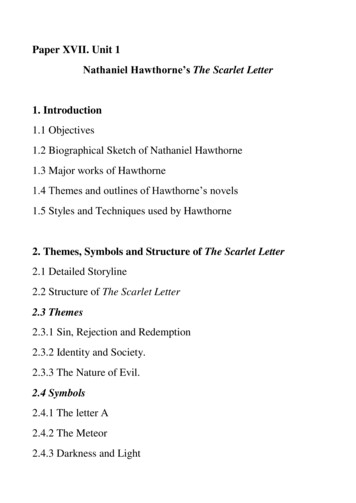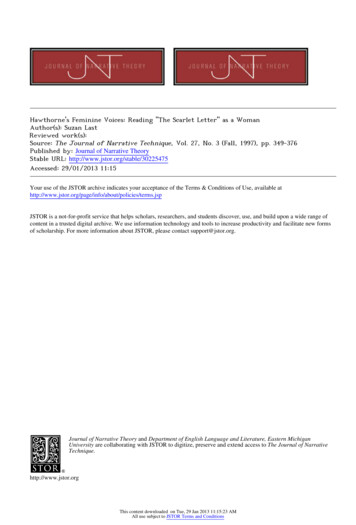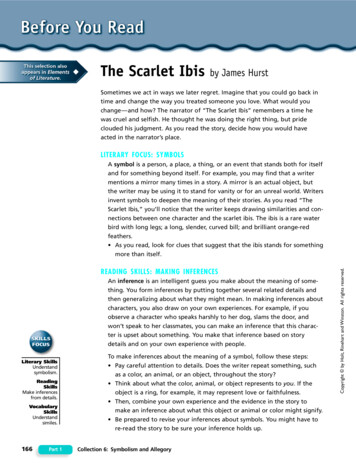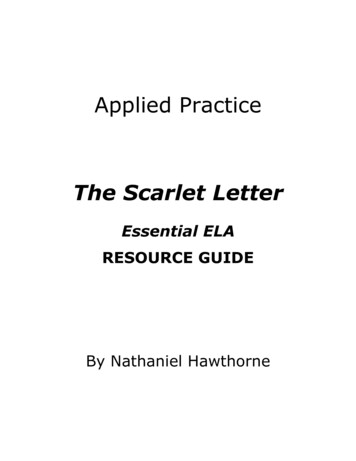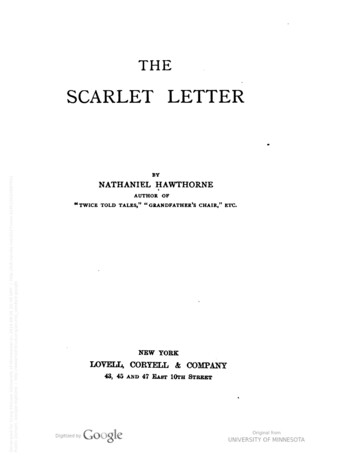
Transcription
The Scarlet LetterNathaniel HawthorneThis eBook is designed and published by Planet PDF. For more freeeBooks visit our Web site at http://www.planetpdf.com/.
The Scarlet LetterEDITOR’S NOTENathaniel Hawthorne was already a man of forty-six,and a tale writer of some twenty-four years’ standing,when ‘The Scarlet Letter’ appeared. He was born atSalem, Mass., on July 4th, 1804, son of a sea-captain. Heled there a shy and rather sombre life; of few artisticencouragements, yet not wholly uncongenial, his moody,intensely meditative temperament being considered. Itscolours and shadows are marvelously reflected in his‘Twice-Told Tales’ and other short stories, the product ofhis first literary period. Even his college days at Bowdoindid not quite break through his acquired and inheritedreserve; but beneath it all, his faculty of divining men andwomen was exercised with almost uncanny prescience andsubtlety. ‘The Scarlet Letter,’ which explains as much ofthis unique imaginative art, as is to be gathered fromreading his highest single achievement, yet needs to beranged with his other writings, early and late, to have itslast effect. In the year that saw it published, he began ‘TheHouse of the Seven Gables,’ a later romance or prosetragedy of the Puritan-American community as he hadhimself known it - defrauded of art and the joy of life,2 of 394
The Scarlet Letter‘starving for symbols’ as Emerson has it. NathanielHawthorne died at Plymouth, New Hampshire, on May18th, 1864.The following is the table of his romances, stories, andother works:Fanshawe, published anonymously, 1826; Twice-ToldTales, 1st Series, 1837; 2nd Series, 1842; Grandfather’sChair, a history for youth, 1845: Famous Old People(Grandfather’s Chair), 1841 Liberty Tree: with the lastwords of Grandfather’s Chair, 1842; Biographical Storiesfor Children, 1842; Mosses from an Old Manse, 1846;The Scarlet Letter, 1850; The House of the Seven Gables,1851: True Stories from History and Biography (thewhole History of Grandfather’s Chair), 1851 A WonderBook for Girls and Boys, 1851; The Snow Image andother Tales, 1851: The Blithedale Romance, 1852; Life ofFranklin Pierce, 1852; Tanglewood Tales (2nd Series ofthe Wonder Book), 1853; A Rill from the Town-Pump,with remarks, by Telba, 1857; The Marble Faun; or, TheRomance of Monte Beni (4 EDITOR’S NOTE)(published in England under the title of ‘Transformation’),1860, Our Old Home, 1863; Dolliver Romance (1st Partin ‘Atlantic Monthly’), 1864; in 3 Parts, 1876; Pansie, afragment, Hawthorne’ last literary effort, 1864; American3 of 394
The Scarlet LetterNote-Books, 1868; English Note Books, edited by SophiaHawthorne, 1870; French and Italian Note Books, 1871;Septimius Felton; or, the Elixir of Life (from the ‘AtlanticMonthly’), 1872; Doctor Grimshawe’s Secret, withPreface and Notes by Julian Hawthorne, 1882.Tales of the White Hills, Legends of New England,Legends of the Province House, 1877, contain tales whichhad already been printed in book form in ‘Twice-ToldTales’ and the ‘Mosses’ ‘Sketched and Studies,’ 1883.Hawthorne’s contributions to magazines werenumerous, and most of his tales appeared first inperiodicals, chiefly in ‘The Token,’ 1831-1838, ‘NewEngland Magazine,’ 1834,1835; ‘Knickerbocker,’ 18371839; ‘Democratic Review,’ 1838-1846; ‘AtlanticMonthly,’ 1860-1872 (scenes from the Dolliver Romance,Septimius Felton, and passages from Hawthorne’s NoteBooks).Works: in 24 volumes, 1879; in 12 volumes, withintroductory notes by Lathrop, Riverside Edition, 1883.Biography, etc. ; A. H. Japp (pseud. H. A. Page),Memoir of N. Hawthorne, 1872; J. T. Field’s ‘Yesterdayswith Authors,’ 1873 G. P. Lathrop, ‘A Study ofHawthorne,’ 1876; Henry James English Men of Letters,1879; Julian Hawthorne, ‘Nathaniel Hawthorne and his4 of 394
The Scarlet Letterwife,’ 1885; Moncure D. Conway, Life of NathanielHawthorne, 1891; Analytical Index of Hawthorne’sWorks, by E. M. O’Connor 1882.5 of 394
The Scarlet LetterTHE CUSTOM-HOUSEINTRODUCTORY TO ‘THESCARLET LETTER"It is a little remarkable, that—though disinclined to talkovermuch of myself and my affairs at the fireside, and tomy personal friends—an autobiographical impulse shouldtwice in my life have taken possession of me, in addressingthe public. The first time was three or four years since,when I favoured the reader—inexcusably, and for noearthly reason that either the indulgent reader or theintrusive author could imagine—with a description of myway of life in the deep quietude of an Old Manse. Andnow—because, beyond my deserts, I was happy enough tofind a listener or two on the former occasion—I againseize the public by the button, and talk of my three years’experience in a Custom-House. The example of thefamous ‘P. P. , Clerk of this Parish,’ was never morefaithfully followed. The truth seems to be, however, thatwhen he casts his leaves forth upon the wind, the authoraddresses, not the many who will fling aside his volume,or never take it up, but the few who will understand himbetter than most of his schoolmates or lifemates. Some6 of 394
The Scarlet Letterauthors, indeed, do far more than this, and indulgethemselves in such confidential depths of revelation ascould fittingly be addressed only and exclusively to theone heart and mind of perfect sympathy; as if the printedbook, thrown at large on the wide world, were certain tofind out the divided segment of the writer’s own nature,and complete his circle of existence by bringing him intocommunion with it. It is scarcely decorous, however, tospeak all, even where we speak impersonally. But, asthoughts are frozen and utterance benumbed, unless thespeaker stand in some true relation with his audience, itmay be pardonable to imagine that a friend, a kind andapprehensive, though not the closest friend, is listening toour talk; and then, a native reserve being thawed by thisgenial consciousness, we may prate of the circumstancesthat lie around us, and even of ourself, but still keep theinmost Me behind its veil. To this extent, and within theselimits, an author, methinks, may be autobiographical,without violating either the reader’s rights or his own.It will be seen, likewise, that this Custom-House sketchhas a certain propriety, of a kind always recognised inliterature, as explaining how a large portion of thefollowing pages came into my possession, and as offeringproofs of the authenticity of a narrative therein contained.7 of 394
The Scarlet LetterThis, in fact—a desire to put myself in my true position aseditor, or very little more, of the most prolix among thetales that make up my volume—this, and no other, is mytrue reason for assuming a personal relation with thepublic. In accomplishing the main purpose, it has appearedallowable, by a few extra touches, to give a faintrepresentation of a mode of life not heretofore described,together with some of the characters that move in it,among whom the author happened to make one.In my native town of Salem, at the head of what, half acentury ago, in the days of old King Derby, was a bustlingwharf—but which is now burdened with decayed woodenwarehouses, and exhibits few or no symptoms ofcommercial life; except, perhaps, a bark or brig, half-waydown its melancholy length, discharging hides; or, nearerat hand, a Nova Scotia schooner, pitching out her cargo offirewood—at the head, I say, of this dilapidated wharf,which the tide often overflows, and along which, at thebase and in the rear of the row of buildings, the track ofmany languid years is seen in a border of unthrifty grass—here, with a view from its front windows adown this notvery enlivening prospect, and thence across the harbour,stands a spacious edifice of brick. From the loftiest point ofits roof, during precisely three and a half hours of each8 of 394
The Scarlet Letterforenoon, floats or droops, in breeze or calm, the bannerof the republic; but with the thirteen stripes turnedvertically, instead of horizontally, and thus indicating that acivil, and not a military, post of Uncle Sam’s governmentis here established. Its front is ornamented with a porticoof half-a-dozen wooden pillars, supporting a balcony,beneath which a flight of wide granite steps descendstowards the street Over the entrance hovers an enormousspecimen of the American eagle, with outspread wings, ashield before her breast, and, if I recollect aright, a bunchof intermingled thunder- bolts and barbed arrows in eachclaw. With the customary infirmity of temper thatcharacterizes this unhappy fowl, she appears by thefierceness of her beak and eye, and the general truculencyof her attitude, to threaten mischief to the inoffensivecommunity; and especially to warn all citizens careful oftheir safety against intruding on the premises which sheovershadows with her wings. Nevertheless, vixenly as shelooks, many people are seeking at this very moment toshelter themselves under the wing of the federal eagle;imagining, I presume, that her bosom has all the softnessand snugness of an eiderdown pillow. But she has no greattenderness even in her best of moods, and, sooner orlater—oftener soon than late—is apt to fling off her9 of 394
The Scarlet Letternestlings with a scratch of her claw, a dab of her beak, or arankling wound from her barbed arrows.The pavement round about the above-describededifice—which we may as well name at once as theCustom-House of the port—has grass enough growing inits chinks to show that it has not, of late days, been wornby any multitudinous resort of business. In some monthsof the year, however, there often chances a forenoonwhen affairs move onward with a livelier tread. Suchoccasions might remind the elderly citizen of that period,before the last war with England, when Salem was a portby itself; not scorned, as she is now, by her own merchantsand ship-owners, who permit her wharves to crumble toruin while their ventures go to swell, needlessly andimperceptibly, the mighty flood of commerce at NewYork or Boston. On some such morning, when three orfour vessels happen to have arrived at once usually fromAfrica or South America—or to be on the verge of theirdeparture thitherward, there is a sound of frequent feetpassing briskly up and down the granite steps. Here, beforehis own wife has greeted him, you may greet the seaflushed ship-master, just in port, with his vessel’s papersunder his arm in a tarnished tin box. Here, too, comes hisowner, cheerful, sombre, gracious or in the sulks,10 of 394
The Scarlet Letteraccordingly as his scheme of the now accomplishedvoyage has been realized in merchandise that will readilybe turned to gold, or has buried him under a bulk ofincommodities such as nobody will care to rid him of.Here, likewise—the germ of the wrinkle-browed, grizzlybearded, careworn merchant—we have the smart youngclerk, who gets the taste of traffic as a wolf-cub does ofblood, and already sends adventures in his master’s ships,when he had better be sailing mimic boats upon a millpond. Another figure in the scene is the outward-boundsailor, in quest of a protection; or the recently arrived one,pale and feeble, seeking a passport to the hospital. Normust we forget the captains of the rusty little schoonersthat bring firewood from the British provinces; a roughlooking set of tarpaulins, without the alertness of theYankee aspect, but contributing an item of no slightimportance to our decaying trade.Cluster all these individuals together, as they sometimeswere, with other miscellaneous ones to diversify thegroup, and, for the time being, it made the CustomHouse a stirring scene. More frequently, however, onascending the steps, you would discern — in the entry if itwere summer time, or in their appropriate rooms if wintryor inclement weathers row of venerable figures, sitting in11 of 394
The Scarlet Letterold-fashioned chairs, which were tipped on their hind legsback against the wall. Oftentimes they were asleep, butoccasionally might be heard talking together, ill voicesbetween a speech and a snore, and with that lack of energythat distinguishes the occupants of alms-houses, and allother human beings who depend for subsistence oncharity, on monopolized labour, or anything else but theirown independent exertions. These old gentlemen—seated,like Matthew at the receipt of custom, but not very liableto be summoned thence, like him, for apostolic errands—were Custom-House officers.Furthermore, on the left hand as you enter the frontdoor, is a certain room or office, about fifteen feet square,and of a lofty height, with two of its arched windowscommanding a view of the aforesaid dilapidated wharf,and the third looking across a narrow lane, and along aportion of Derby Street. All three give glimpses of theshops of grocers, block-makers, slop-sellers, and shipchandlers, around the doors of which are generally to beseen, laughing and gossiping, clusters of old salts, and suchother wharf-rats as haunt the Wapping of a seaport. Theroom itself is cobwebbed, and dingy with old paint; itsfloor is strewn with grey sand, in a fashion that haselsewhere fallen into long disuse; and it is easy to12 of 394
The Scarlet Letterconclude, from the general slovenliness of the place, thatthis is a sanctuary into which womankind, with her toolsof magic, the broom and mop, has very infrequent access.In the way of furniture, there is a stove with a voluminousfunnel; an old pine desk with a three-legged stool besideit; two or three wooden-bottom chairs, exceedinglydecrepit and infirm; and—not to forget the library—onsome shelves, a score or two of volumes of the Acts ofCongress, and a bulky Digest of the Revenue laws. A tinpipe ascends through the ceiling, and forms a medium ofvocal communication with other parts of be edifice. Andhere, some six months ago—pacing from corner to corner,or lounging on the long-legged tool, with his elbow onthe desk, and his eyes wandering up and down thecolumns of the morning newspaper—you might haverecognised, honoured reader, the same individual whowelcomed you into his cheery little study, where thesunshine glimmered so pleasantly through the willowbranches on the western side of the Old Manse. But now,should you go thither to seek him, you would inquire invain for the Locofoco Surveyor. The besom of reformhath swept him out of office, and a worthier successorwears his dignity and pockets his emoluments.13 of 394
The Scarlet LetterThis old town of Salem—my native place, though Ihave dwelt much away from it both in boyhood andmaturer years—possesses, or did possess, a hold on myaffection, the force of which I have never realized duringmy seasons of actual residence here. Indeed, so far as itsphysical aspect is concerned, with its flat, unvaried surface,covered chiefly with wooden houses, few or none ofwhich pretend to architectural beauty—its irregularity,which is neither picturesque nor quaint, but only tame—its long and lazy street, lounging wearisomely through thewhole extent of the peninsula, with Gallows Hill and NewGuinea at one end, and a view of the alms-house at theother—such being the features of my native town, itwould be quite as reasonable to form a sentimentalattachment to a disarranged checker-board. And yet,though invariably happiest elsewhere, there is within me afeeling for Old Salem, which, in lack of a better phrase, Imust be content to call affection. The sentiment isprobably assignable to the deep and aged roots which myfamily has stuck into the soil. It is now nearly twocenturies and a quarter since the original Briton, theearliest emigrant of my name, made his appearance in thewild and forest—bordered settlement which has sincebecome a city. And here his descendants have been born14 of 394
The Scarlet Letterand died, and have mingled their earthly substance withthe soil, until no small portion of it must necessarily beakin to the mortal frame wherewith, for a little while, Iwalk the streets. In part, therefore, the attachment which Ispeak of is the mere sensuous sympathy of dust for dust.Few of my countrymen can know what it is; nor, asfrequent transplantation is perhaps better for the stock,need they consider it desirable to know.But the sentiment has likewise its moral quality. Thefigure of that first ancestor, invested by family traditionwith a dim and dusky grandeur, was present to my boyishimagination as far back as I can remember. It still hauntsme, and induces a sort of home-feeling with the past,which I scarcely claim in reference to the present phase ofthe town. I seem to have a stronger claim to a residencehere on account of this grave, bearded, sable-cloaked, andsteeple-crowned progenitor-who came so early, with hisBible and his sword, and trode the unworn street withsuch a stately port, and made so large a figure, as a man ofwar and peace—a stronger claim than for myself, whosename is seldom heard and my face hardly known. He wasa soldier, legislator, judge; he was a ruler in the Church;he had all the Puritanic traits, both good and evil. He waslikewise a bitter persecutor; as witness the Quakers, who15 of 394
The Scarlet Letterhave remembered him in their histories, and relate anincident of his hard severity towards a woman of theirsect, which will last longer, it is to be feared, than anyrecord of his better deeds, although these were many. Hisson, too, inherited the persecuting spirit, and made himselfso conspicuous in the martyrdom of the witches, that theirblood may fairly be said to have left a stain upon him. Sodeep a stain, indeed, that his dry old bones, in theCharter-street burial-ground, must still retain it, if theyhave not crumbled utterly to dust I know not whetherthese ancestors of mine bethought themselves to repent,and ask pardon of Heaven for their cruelties; or whetherthey are now groaning under the heavy consequences ofthem in another state of being. At all events, I, the presentwriter, as their representative, hereby take shame uponmyself for their sakes, and pray that any curse incurred bythem—as I have heard, and as the dreary andunprosperous condition of the race, for many a long yearback, would argue to exist—may be now and henceforthremoved.Doubtless, however, either of these stern and blackbrowed Puritans would have thought it quite a sufficientretribution for his sins that, after so long a lapse of years,the old trunk of the family tree, with so much venerable16 of 394
The Scarlet Lettermoss upon it, should have borne, as its topmost bough, anidler like myself. No aim that I have ever cherished wouldthey recognise as laudable; no success of mine—if my life,beyond its domestic scope, had ever been brightened bysuccess—would they deem otherwise than worthless, ifnot positively disgraceful. ‘What is he?’ murmurs one greyshadow of my forefathers to the other. ‘A writer of storybooks! What kind of business in life—what mode ofglorifying God, or being serviceable to mankind in his dayand generation—may that be? Why, the degenerate fellowmight as well have been a fiddler!’ Such are thecompliments bandied between my great grandsires andmyself, across the gulf of time And yet, let them scorn meas they will, strong traits of their nature have intertwinedthemselves with mine.Planted deep, in the town’s earliest infancy andchildhood, by these two earnest and energetic men, therace has ever since subsisted here; always, too, inrespectability; never, so far as I have known, disgraced by asingle unworthy member; but seldom or never, on theother hand, after the first two generations, performing anymemorable deed, or so much as putting forward a claim topublic notice. Gradually, they have sunk almost out ofsight; as old houses, here and there about the streets, get17 of 394
The Scarlet Lettercovered half-way to the eaves by the accumulation of newsoil. From father to son, for above a hundred years, theyfollowed the sea; a grey-headed shipmaster, in eachgeneration, retiring from the quarter-deck to thehomestead, while a boy of fourteen took the hereditaryplace before the mast, confronting the salt spray and thegale which had blustered against his sire and grandsire.The boy, also in due time, passed from the forecastle tothe cabin, spent a tempestuous manhood, and returnedfrom his world-wanderings, to grow old, and die, andmingle his dust with the natal earth. This long connexionof a family with one spot, as its place of birth and burial,creates a kindred between the human being and thelocality, quite independent of any charm in the scenery ormoral circumstances that surround him. It is not love butinstinct. The new inhabitant—who came himself from aforeign land, or whose father or grandfather came—haslittle claim to be called a Salemite; he has no conception ofthe oyster—like tenacity with which an old settler, overwhom his third century is creeping, clings to the spotwhere his successive generations have been embedded. Itis no matter that the place is joyless for him; that he isweary of the old wooden houses, the mud and dust, thedead level of site and sentiment, the chill east wind, and18 of 394
The Scarlet Letterthe chillest of social atmospheres;—all these, and whateverfaults besides he may see or imagine, are nothing to thepurpose. The spell survives, and just as powerfully as if thenatal spot were an earthly paradise. So has it been in mycase. I felt it almost as a destiny to make Salem my home;so that the mould of features and cast of character whichhad all along been familiar here—ever, as onerepresentative of the race lay down in the grave, anotherassuming, as it were, his sentry-march along the mainstreet—might still in my little day be seen and recognisedin the old town. Nevertheless, this very sentiment is anevidence that the connexion, which has become anunhealthy one, should at least be severed. Human naturewill not flourish, any more than a potato, if it be plantedand re-planted, for too long a series of generations, in thesame worn-out soil. My children have had other birthplaces, and, so far as their fortunes may be within mycontrol, shall strike their roots into accustomed earth.On emerging from the Old Manse, it was chiefly thisstrange, indolent, unjoyous attachment for my native townthat brought me to fill a place in Uncle Sam’s brickedifice, when I might as well, or better, have gonesomewhere else. My doom was on me, It was not the firsttime, nor the second, that I had gone away—as it seemed,19 of 394
The Scarlet Letterpermanently—but yet returned, like the bad halfpenny, oras if Salem were for me the inevitable centre of theuniverse. So, one fine morning I ascended the flight ofgranite steps, with the President’s commission in mypocket, and was introduced to the corps of gentlemenwho were to aid me in my weighty responsibility as chiefexecutive officer of the Custom-House.I doubt greatly—or, rather, I do not doubt at all—whether any public functionary of the United States,either in the civil or military line, has ever had such apatriarchal body of veterans under his orders as myself.The whereabouts of the Oldest Inhabitant was at oncesettled when I looked at them. For upwards of twentyyears before this epoch, the independent position of theCollector had kept the Salem Custom-House out of thewhirlpool of political vicissitude, which makes the tenureof office generally so fragile. A soldier—New England’smost distinguished soldier—he stood firmly on thepedestal of his gallant services; and, himself secure in thewise liberality of the successive administrations throughwhich he had held office, he had been the safety of hissubordinates in many an hour of danger and heart-quakeGeneral Miller was radically conservative; a man overwhose kindly nature habit had no slight influence;20 of 394
The Scarlet Letterattaching himself strongly to familiar faces, and withdifficulty moved to change, even when change might havebrought unquestionable improvement. Thus, on takingcharge of my department, I found few but aged men.They were ancient sea-captains, for the most part, who,after being tossed on every sea, and standing up sturdilyagainst life’s tempestuous blast, had finally drifted into thisquiet nook, where, with little to disturb them, except theperiodical terrors of a Presidential election, they one andall acquired a new lease of existence. Though by no meansless liable than their fellow-men to age and infirmity, theyhad evidently some talisman or other that kept death atbay. Two or three of their number, as I was assured, beinggouty and rheumatic, or perhaps bed-ridden, neverdreamed of making their appearance at the Custom-Houseduring a large part of the year; but, after a torpid winter,would creep out into the warm sunshine of May or June,go lazily about what they termed duty, and, at their ownleisure and convenience, betake themselves to bed again. Imust plead guilty to the charge of abbreviating the officialbreath of more than one of these venerable servants of therepublic. They were allowed, on my representation, torest from their arduous labours, and soon afterwards—as iftheir sole principle of life had been zeal for their country’s21 of 394
The Scarlet Letterservice—as I verily believe it was—withdrew to a betterworld. It is a pious consolation to me that, through myinterference, a sufficient space was allowed them forrepentance of the evil and corrupt practices into which, asa matter of course, every Custom-House officer must besupposed to fall. Neither the front nor the back entranceof the Custom-House opens on the road to Paradise.The greater part of my officers were Whigs. It was wellfor their venerable brotherhood that the new Surveyorwas not a politician, and though a faithful Democrat inprinciple, neither received nor held his office with anyreference to political services. Had it been otherwise—hadan active politician been put into this influential post, toassume the easy task of making head against a WhigCollector, whose infirmities withheld him from thepersonal administration of his office—hardly a man of theold corps would have drawn the breath of official lifewithin a month after the exterminating angel had come upthe Custom-House steps. According to the received codein such matters, it would have been nothing short of duty,in a politician, to bring every one of those white headsunder the axe of the guillotine. It was plain enough todiscern that the old fellows dreaded some such discourtesyat my hands. It pained, and at the same time amused me,22 of 394
The Scarlet Letterto behold the terrors that attended my advent, to see afurrowed cheek, weather-beaten by half a century ofstorm, turn ashy pale at the glance of so harmless anindividual as myself; to detect, as one or another addressedme, the tremor of a voice which, in long-past days, hadbeen wont to bellow through a speaking-trumpet,hoarsely enough to frighten Boreas himself to silence.They knew, these excellent old persons, that, by allestablished rule—and, as regarded some of them, weighedby their own lack of efficiency for business—they ought tohave given place to younger men, more orthodox inpolitics, and altogether fitter than themselves to serve ourcommon Uncle. I knew it, too, but could never quite findin my heart to act upon the knowledge. Much anddeservedly to my own discredit, therefore, andconsiderably to the detriment of my official conscience,they continued, during my incumbency, to creep aboutthe wharves, and loiter up and down the Custom-Housesteps. They spent a good deal of time, also, asleep in theiraccustomed corners, with their chairs tilted back againstthe walls; awaking, however, once or twice in theforenoon, to bore one another with the several thousandthrepetition of old sea-stories and mouldy jokes, that hadgrown to be passwords and countersigns among them.23 of 394
The Scarlet LetterThe discovery was soon made, I imagine, that the newSurveyor had no great harm in him. So, with lightsomehearts and the happy consciousness of being usefullyemployed—in their own behalf at least, if not for ourbeloved country—these good old gentlemen wentthrough the various formalities of office. Sagaciously undertheir spectacles, did they peep into the holds of vesselsMighty was their fuss about little matters, and marvellous,sometimes, the obtuseness that allowed greater ones to slipbetween their fingers Whenever such a mischanceoccurred—when a waggon-load of valuable merchandisehad been smuggled ashore, at noonday, perhaps, anddirectly beneath their unsuspicious noses—nothing couldexceed the vigilance and alacrity with which theyproceeded to lock, and double-lock, and secure with tapeand sealing—wax, all the avenues of the delinquent vessel.Instead of a reprimand for their previous negligence, thecase seemed rather to require an eulogium on theirpraiseworthy caution after the mischief had happened; agrateful recognition of the promptitude of their zeal themoment that there was no longer any remedy.Unless people are more than commonly disagreeable, itis my foolish habit to contract a kindness for them. Thebetter part of my companion’s character, if it have a better24 of 394
The Scarlet Letterpart, is that which usually comes uppermost in my regard,and forms the type whereby I recognise the man. As mostof these old Custom-House officers had good traits, and asmy position in reference to them, being paternal andprotective, was favourable to the growth of friendlysentiments, I soon grew to like them all. It was pleasant inthe summer forenoons—when the fervent heat, thatalmost liquefied the rest of the human family, merelycommunicated a genial warmth to their half torpidsystems—it was pleasant to hear them chatting in the backentry, a row of them all tipped against the wall, as usual;while the frozen witticisms of past generations werethawed out, and came bubbling with laughter from theirlips. Externally, the jollity of aged men has much incommon with the mirth of children; the intellect, anymore than a deep sense of humour, has
The Scarlet Letter 2 of 394 EDITOR’S NOTE Nathaniel Hawthorne was already a man of forty-six, and a tale writer of some twenty-four years’ standing, when ‘The Scarlet Letter’ appeared. He was born at Salem, Mass., on July 4th, 1804, son of a sea-captain. He led there a shy and rather sombre life; of few artisticFile Size: 1MBPage Count: 394Explore furtherThe Scarlet Letter PDF Book Online - The Scarlet Letter by .libgen.onlThe Scarlet Letter FULL TEXTwww.whsd.k12.pa.us[PDF] The Scarlet Letter Book by Nathaniel Hawthorne (1850 .booksvooks.comTHE SCARLET LETTER - Free eBook Onlinewww.literatureproject.comThe Scarlet Letter Nathaniel Hawthorne Free download PDF .freeditorial.comRecommended to you b

